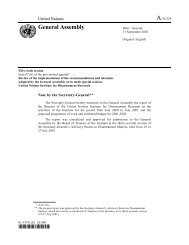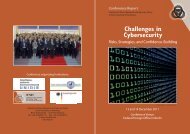Security in Space The Next Generation - UNIDIR
Security in Space The Next Generation - UNIDIR
Security in Space The Next Generation - UNIDIR
Create successful ePaper yourself
Turn your PDF publications into a flip-book with our unique Google optimized e-Paper software.
For this reasons, TCBMs and a treaty bann<strong>in</strong>g weaponization should be<br />
pursued <strong>in</strong> parallel.<br />
Follow<strong>in</strong>g the presentations by the panellists, the ensu<strong>in</strong>g discussion focused<br />
broadly on two issues:<br />
codes of conduct; and<br />
<strong>in</strong>formation shar<strong>in</strong>g.<br />
<strong>The</strong> question was raised about the difference between legally b<strong>in</strong>d<strong>in</strong>g and<br />
politically b<strong>in</strong>d<strong>in</strong>g <strong>in</strong> relation to the proposals for a code of conduct <strong>in</strong> outer<br />
space. <strong>The</strong> discussion centred around the sense that a politically b<strong>in</strong>d<strong>in</strong>g<br />
<strong>in</strong>strument would receive greater support currently and is not dependent<br />
on ratifi cation processes, thus perhaps would be easier to obta<strong>in</strong>.<br />
Interest was expressed as to whether the commercial owners of satellites<br />
are will<strong>in</strong>g to share <strong>in</strong>formation about assets <strong>in</strong> space. <strong>The</strong> answer was that<br />
this <strong>in</strong>formation is already available, because of the obligation to register<br />
every space object with the UN Secretariat. This <strong>in</strong>formation is accessible<br />
to all and experts are able to quickly ascerta<strong>in</strong> the purposes of the satellites<br />
listed accord<strong>in</strong>g to their orbits and types.<br />
SESSION III<br />
FROM CONFRONTATION TO COOPERATION<br />
Nancy Gallagher of the University of Maryland discussed how the end of<br />
the Cold War and <strong>in</strong>creas<strong>in</strong>g dependence on space started a debate <strong>in</strong> the<br />
1990s about the proper approach to the use of space. For most space actors,<br />
the assumption is that space is an environment where cooperation is and<br />
must be the norm, and where the management of debris, traffi c, resources<br />
and so forth could be accomplished through <strong>in</strong>formal tools, such as codes<br />
of conduct. For an important m<strong>in</strong>ority of space actors, the environment is<br />
one of <strong>in</strong>creas<strong>in</strong>g competition, where<strong>in</strong> the security of space assets and<br />
uses is assured through dom<strong>in</strong>ance of that environment.<br />
Which of these approaches will provide the better route to space security?<br />
One way to evaluate this is to exam<strong>in</strong>e the results achieved by the m<strong>in</strong>ority<br />
of actors that seek space dom<strong>in</strong>ance. How much have proponents of space<br />
dom<strong>in</strong>ance achieved to this end? Vast amounts of money have been spent<br />
xxv








